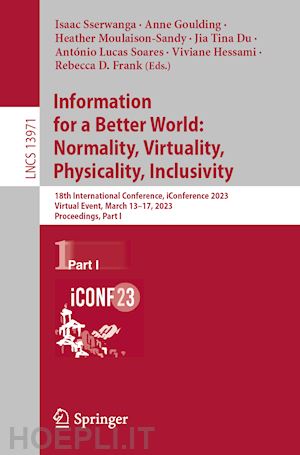
Questo prodotto usufruisce delle SPEDIZIONI GRATIS
selezionando l'opzione Corriere Veloce in fase di ordine.
Pagabile anche con Carta della cultura giovani e del merito, 18App Bonus Cultura e Carta del Docente
The 36 full papers and the 46 short papers presented in these proceedings were carefully reviewed and selected from 197 submissions. They cover topics such as: Archives and Records, Behavioral Research, Information Governance and Ethics, AI and Machine Learning, Data Science, Information and Digital literacy, Cultural Perspectives, Knowledge Management and Intellectual Capital, Social Media and Digital Networks, Libraries, Human-Computer Interaction and Technology, Information Retrieval, Community Informatics, and Digital Information Infrastructure.
Archives and Records.- Are We Missing the Cybersecurity Factors in Recordkeeping?.- Recovering and Reusing Historical Data for Science: Retrospective Curation Practices Across Disciplines.- Receipts: A Case Study of the Sonja Ahlers Archive as Platform Feminism.- Standing on the Outside Looking in: Testing the Concept of Societal Embeddedness from a User and Pluralizing Perspective.- Plus ça change, plus c'est la même chose – The Australian Records Management Case.- Information Sustainability in Rural Bangladesh: the Use of Analogue and Digital Backups.- Measuring Users’ Awareness of Content Recommendation Algorithm: A Survey on Douyin Users in Rural China.- Investigating Factors Influencing Open Government from a Country’s Perspective.- Lex Informatica and Freedom of Expression: Reflections on the Regulation of Internet Trolling Behaviors.- AI & Machine Learning.- “That’s not Damning with Faint Praise”: Understanding the Adoption of Artificial Intelligence for Digital Preservation Tasks.- Effects of Increasing Working Opportunity on Result Quality in Labor-Intensive Crowdsourcing.- Aligning Visual and Lexical Semantics.- An Analysis of Classification Approaches for Hit Song Prediction using Engineered Metadata Features with Lyrics and Audio.- How Many Features Do We Need to Identify Bots on Twitter?.- Data Science.- Disparity in the Evolving COVID-19 Collaboration Network.- Text Mining and Visualization of Political Party Programmes Using Keyword Extraction Methods: The Case of Portuguese Legislative Elections.- Exploring the Impact of the Quality of Social Media Early Adopters on Vaccine Adoption.- Characterizing Data Practices in Research Papers across Four Disciplines.-Information and Digital literacy.- Fighting Misinformation: Where Are We and Where to Go.- The Potential of Digital Literacy to Curb Problematic Information: An Integrative Literature Review.- Coding Funds of Knowledge in [media lab] Student Stories about Technologies.- An Exploratory Study of Intergenerational Technical Help from the Youth’s Perspective.- Exploring the Association Between Multiple Classifications and Journal Rankings.- The Design, Development, and Implementation of an LIS General Education Course for Non-LIS University Students in the Philippines.- “It's nice to Mix up the Rhythm”: Undergraduates’ Experiences in a Large Blended Learning Course in Information Science in the Context of COVID-19.- Visual Information Processing in Virtual Reality: Merging Theory and Practice.- From Noisy Data to Useful Color Palettes: One Step in Making Biodiversity DataFAIR.- Cultural Perspectives.- “Will the Day Ever Come When We Will Be Judged on Our Merit and Not on Our Blackness?” The Black Caucus of the American Library Association and the Long Freedom Struggle in the United States, 1970-1975.- How Inclusive are the International Conferences? Attending Conferences in an Unequal World.- Locating Black Information Lives: “Scoping” the literature on African American Genealogical Researchers.- Do you speak meme? A Dynamic Digital Language for the Information Society.











Il sito utilizza cookie ed altri strumenti di tracciamento che raccolgono informazioni dal dispositivo dell’utente. Oltre ai cookie tecnici ed analitici aggregati, strettamente necessari per il funzionamento di questo sito web, previo consenso dell’utente possono essere installati cookie di profilazione e marketing e cookie dei social media. Cliccando su “Accetto tutti i cookie” saranno attivate tutte le categorie di cookie. Per accettare solo deterninate categorie di cookie, cliccare invece su “Impostazioni cookie”. Chiudendo il banner o continuando a navigare saranno installati solo cookie tecnici. Per maggiori dettagli, consultare la Cookie Policy.